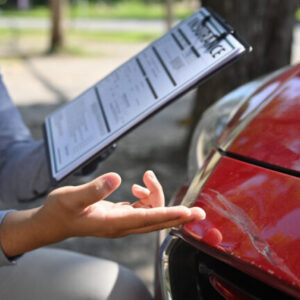A car accident can be a stressful and disorienting experience. Knowing what steps to take immediately after can protect your safety, rights, and future insurance claims. This guide breaks down exactly what you need to do if you find yourself in a car accident in India.
What To Do Immediately After a Car Accident in India
The seconds and minutes following an accident are crucial. Here’s your immediate action plan:
- Check for Injuries: Your safety and the safety of others is paramount. Assess yourself and your passengers for any injuries.
- Move to Safety (If Possible): If your vehicle is drivable and it’s safe to do so, move it to the side of the road to prevent further accidents and obstruction of traffic. Turn on your hazard lights.
- Call for Help: Dial 112, the national emergency number in India, to request police and ambulance assistance if anyone is injured or if the accident is severe. If in Delhi, you can also call 1095 for police assistance specifically.
- Stay Calm: Take deep breaths. Accidents are upsetting, but staying calm will help you think clearly and take necessary steps.
Securing the Scene and Reporting the Accident: Your First Steps
Once immediate safety is addressed, secure the scene and report the accident:
- Set up Warning Devices: If you have them, place warning triangles or cones a safe distance from the accident site to alert oncoming traffic.
- File a Police Report (FIR): This is a critical step, especially if there are injuries, significant property damage, or disputes about who is at fault. The police will create a First Information Report (FIR). You’ll need this FIR number for your insurance claim. Even for seemingly minor accidents, filing an FIR is recommended, especially considering potential future complications.
- Reporting Thresholds & State Laws: While a national threshold doesn’t exist, some states have specific reporting requirements for accidents resulting in damages above a certain monetary value. For instance, in some metropolitan areas, accidents causing damage exceeding ₹5,000 might necessitate a mandatory report even if no one is hurt. Always check the specific regulations for your state or union territory. The Motor Vehicles Act, 1988, governs road traffic offences and liabilities, but specific implementation can vary.
- Document the Scene: Use your phone to take pictures and videos of the accident scene, including:
- All vehicles involved, showing the damage from multiple angles.
- License plates of all vehicles.
- The surrounding area, including road signs, traffic signals, and any contributing factors (e.g., potholes, obstructions).
Gathering Crucial Information for Your Insurance Claim Post-Car Accident
Collecting detailed information at the scene is essential for a smooth insurance claim process:
- Exchange Information: Obtain the following information from all involved parties:
- Full names
- Addresses
- Phone numbers
- Driver’s license numbers
- Vehicle registration numbers
- Insurance company name and policy number
- Witness Information: If there are any witnesses, get their names, addresses, and phone numbers. Their accounts can be valuable if liability is disputed.
- Detailed Accident Description: Write down your recollection of the accident as soon as possible while it’s still fresh in your mind. Include details such as the time of day, weather conditions, speed, and what each vehicle was doing before the collision.
- Example Scenario: You’re rear-ended at a traffic light. The other driver claims you stopped abruptly. A witness saw that the light turned yellow, and you stopped normally. The witness’s statement could be vital in proving the other driver’s negligence.
Navigating Indian Car Accident Laws and Your Rights
Understanding Indian car accident laws is vital for protecting your rights:
- Motor Vehicles Act, 1988: This is the primary legislation governing road accidents in India. It outlines liabilities, compensation, and procedures for claiming damages.
- Liability: Generally, the person at fault for the accident is liable for the damages. This could be due to negligence, reckless driving, or violation of traffic rules.
- Negligence: The concept of negligence is central to determining fault. Negligence means a failure to exercise reasonable care, resulting in harm to another person or their property.
- Your Rights: You have the right to claim compensation for damages to your vehicle, medical expenses, lost wages (if applicable), and pain and suffering.
Understanding Your Car Insurance Policy and the Claim Process
Your car insurance policy is your safety net after an accident. Understand its coverage and the claim process:
- Types of Coverage:
- Third-Party Liability: This is mandatory in India and covers damages you cause to another person’s vehicle or property.
- Comprehensive Insurance: This covers both third-party liabilities and damages to your own vehicle, even if you are at fault.
- Policy Review: Carefully review your insurance policy to understand the extent of your coverage, any exclusions, and the claim process.
- Notify Your Insurer: Inform your insurance company about the accident as soon as possible. Most policies have a time limit for reporting claims.
- Claim Form: Fill out the claim form accurately and completely, providing all necessary details and documentation, including the FIR copy, vehicle registration, driver’s license, and repair estimates.
- Surveyor Assessment: The insurance company will send a surveyor to assess the damage to your vehicle. Cooperate with the surveyor and provide any information they request.
- Negotiating Settlements: Insurance companies might offer a settlement amount that is lower than what you believe you are entitled to. Be prepared to negotiate, providing evidence to support your claim for higher compensation. Get multiple repair estimates to show the actual cost of repairs. If you feel the offer is unfair, you can explore legal options.
- Example Negotiation: Your car’s bumper was damaged, and the insurer offers ₹5,000, but repair estimates range from ₹8,000-₹10,000. Present the estimates to the insurer and negotiate for a higher settlement based on the actual repair costs.
Third Party Car Insurance Claim Process in India: A Step-by-Step Guide
If you are claiming against another party’s insurance (third-party claim):
- File an FIR: As mentioned before, this is essential.
- Obtain the Other Driver’s Information: Get their insurance details (company name, policy number) and vehicle information.
- Notify Their Insurance Company: Inform the other driver’s insurance company about the accident and your intention to file a claim.
- File a Claim with the Motor Accidents Claims Tribunal (MACT): For significant injuries or fatalities, you may need to file a claim with the MACT. This tribunal specializes in resolving accident compensation claims.
- Gather Evidence: Collect all relevant documents, including the FIR, medical reports (if any), repair estimates, and witness statements.
- Tribunal Proceedings (If Applicable): If the claim goes to the MACT, you will need to attend hearings and present your evidence.
Legal Recourse and Seeking Compensation After a Car Accident in India
If you are dissatisfied with the insurance settlement or face difficulties in claiming compensation, consider these options:
- Legal Consultation: Consult with a lawyer specializing in motor accident claims. They can advise you on your legal rights and options.
- Motor Accidents Claims Tribunal (MACT): As mentioned above, the MACT is a specialized court that deals with accident compensation claims. You can file a claim with the MACT if you are seeking compensation for injuries, death, or property damage.
- Diminished Value Claims: If your car has been significantly damaged and repaired, its resale value might be lower than before the accident, even after repairs. This is called “diminished value.” In some cases, you can claim compensation for this diminished value, especially if the accident was not your fault. Evidence of diminished value often requires a professional appraisal.
- Dealing with Uninsured/Uncooperative Drivers: If the at-fault driver is uninsured or uncooperative, claiming compensation can be more challenging. You can still file a claim with the MACT, and the tribunal may order the driver to pay compensation. The Motor Vehicles Act also has provisions for a Solatium Fund to compensate victims of hit-and-run accidents or accidents involving uninsured vehicles, but the amount is usually limited.
Knowing these steps empowers you to handle the situation effectively and protect your interests following a car accident. Remember, seeking professional legal and insurance advice is always a wise decision to ensure you receive the compensation you deserve.







Wonderful web site. Lots of helpful information here. I am sending it to some friends ans also sharing in delicious. And certainly, thank you for your sweat!